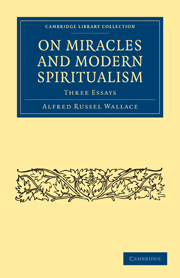Book contents
- Frontmatter
- Contents
- Dedication
- PREFACE
- I AN ANSWER TO THE ARGUMENTS OF HUME, LECKY, AND OTHERS AGAINST MIRACLES
- II THE SCIENTIFIC ASPECT OF THE SUPERNATURAL—
- 1 Introductory
- 2 Miracles and Modern Science
- 3 Modern Miracles viewed as Natural Phenomena
- 4 Od-Force, Animal Magnetism, and Clairvoyance
- 5 The Evidence of the Reality of, Apparitions
- 6 Modern Spiritualism: Evidence of Men of Science
- 7 Evidence of Literary and Professional Men to the Facts of Modern Spiritualism
- 8 The Theory of Spiritualism
- 9 The Moral Teachings of Spiritualism
- 10 Notes of Personal Evidence
- III A DEFENCE OF MODERN SPIRITUALISM
- APPENDIX
- INDEX
3 - Modern Miracles viewed as Natural Phenomena
Published online by Cambridge University Press: 29 August 2010
- Frontmatter
- Contents
- Dedication
- PREFACE
- I AN ANSWER TO THE ARGUMENTS OF HUME, LECKY, AND OTHERS AGAINST MIRACLES
- II THE SCIENTIFIC ASPECT OF THE SUPERNATURAL—
- 1 Introductory
- 2 Miracles and Modern Science
- 3 Modern Miracles viewed as Natural Phenomena
- 4 Od-Force, Animal Magnetism, and Clairvoyance
- 5 The Evidence of the Reality of, Apparitions
- 6 Modern Spiritualism: Evidence of Men of Science
- 7 Evidence of Literary and Professional Men to the Facts of Modern Spiritualism
- 8 The Theory of Spiritualism
- 9 The Moral Teachings of Spiritualism
- 10 Notes of Personal Evidence
- III A DEFENCE OF MODERN SPIRITUALISM
- APPENDIX
- INDEX
Summary
One very powerful argument against miracles with men of intelligence (and especially with such as are acquainted with the full scope of the revelations of modern science), is derived from the prevalent assumption that, if real, they are the direct acts of the Deity. The nature of these acts is often such, that no cultivated mind can for a moment impute them to an infinite and supreme being. Few if any reputed miracles are at all worthy of a God; and it is the man of science who is best enabled to form a proper conception of the lofty and unapproachable nature of the attributes which must pertain to the supreme mind of the universe. Strange to say, however, he is in most cases illogical enough to consider the difficulties in the way of this assumption as a valid argument against the facts in question having ever occurred, instead of being merely one against the mode of interpreting them. He even carries this objection further, by the equally unfounded assumption that any beings who could possibly produce the asserted phenomena must be mentally of a high order, and therefore, if the phenomena do not accord with his ideas of the dignity of superior intelligences, he simply denies the facts without examination. Yet many of these objectors admit that the mind of man is probably not annihilated at death, and that therefore countless millions of beings are constantly passing into another mode of existence, who, unless a miracle of mental transformation takes place, must be very far inferior to himself.
- Type
- Chapter
- Information
- On Miracles and Modern SpiritualismThree Essays, pp. 44 - 51Publisher: Cambridge University PressPrint publication year: 2009First published in: 1875

